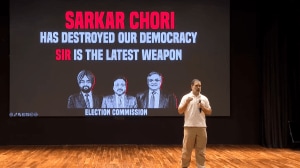Washington sends Twitter delegation to Moscow,via Silicon Valley
Call it geek diplomacy. This week,in lieu of the Congressmen and Capitalists who typically make up delegations to Russia...
Call it geek diplomacy. This week,in lieu of the Congressmen and Capitalists who typically make up delegations to Russia,Washington sent a detachment of Silicon Valley dreamboats: The 33-year-old creator of Twitter; the chief lizard wrangler of Mozilla; the chief executive of EBay; and for good measure Ashton Kutcher,the worlds most popular Tweeter.
The approach is unorthodox,punctuated by such strange moments as Kutchers tweeted discovery of a Siberian man whose arm bore a large tattoo of his face. But it indicates how seriously Washington takes online networking as a social force.
Among the delegations goals was to persuade Russias thriving online social networks to take up social causes like fighting corruption or human trafficking,said Jared Cohen,who serves on Secretary of State Hillary Rodham Clintons policy planning staff. These platforms are more than just ways to make money theyre affecting the lives of people for better or for worse, Cohen said.
Russia has already developed the worlds most active social networking audience,with the average adult spending 6.6 hours a month on networking sites,according to the market research company comScore based in Virginia. (The worldwide average is 3.7 hours). The government makes little effort to censor the Internet,which has become a key platform for dissenters like Maj Alexei A Dymovsky,who last November posted videos saying that the police were under pressure to fabricate charges.
The projects proposed by the American delegation were neutral by comparison: a mobile-phone-based programme to assist new mothers; a safe jobs index to protect women from human trafficking; and jobs tailored to deter young programmers from becoming professional hackers.
In a Wall Street Journal article last week,Evgeny Morozov chided the State Department for indulging in techno-utopianism,the notion that social networking has a natural democratising effect. On the contrary,he argued,crowds mobilised online tend to be chaotic and driven by internal debates,while repressive governments use the same platforms,often anonymously,to distribute propaganda.



- 01
- 02
- 03
- 04
- 05




























